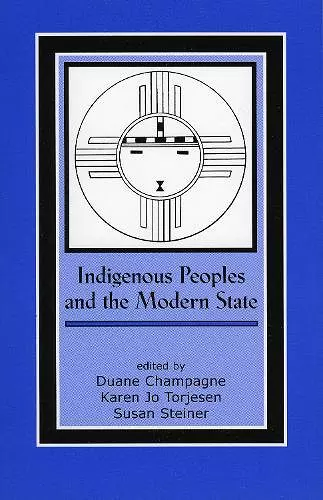Indigenous Peoples and the Modern State
Karen Jo Torjesen editor Duane Champagne editor Susan Steiner editor
Format:Paperback
Publisher:AltaMira Press
Published:3rd Jun '05
Currently unavailable, and unfortunately no date known when it will be back

Champagne and his distinguished coauthors reveal how the structure of a multinational state has the potential to create more equal and just national communities for Native peoples around the globe. Many countries still face extreme differences among ethnic groups and submerged nations, leading to marginalization and violence. Examining these inherent instabilities in multicultural nations such as the U.S., Canada, Mexico, and Guatemala, the authors confront problems of coerced assimilation for indigenous communities whose identities predate the formation of the nation states, often by thousands of years. The contributors show how indigenous people seek to preserve their territory, their rights to self-government, and their culture. This book is a valuable resource for Native American, Canadian and Latin American studies; comparative indigenous governments; constitutional law; and international relations.
Finally, a book on indigenous peoples of the North American continent, from the Arctic to Mesoamerica, a distinctly different version of the North American Free Trade Agreement—NAFTA—the cause of the Zapatista indigenous uprising in Mexico. Indigenous Peoples and the Modern State is a valuable addition to indigenous literature and will be a useful text for indigenous studies courses. -- Roxanne Dunbar Ortiz, California State University, Hayward, Director of Indigenous World Association
Indigenous Peoples and the Modern State offers a broad and richly comparative study critically analyzing the generally contentious but occasionally cooperative relationships between aboriginal peoples and three contemporary states—U.S., Canada, and Mexico. Utilizing a 'trilateral' approach, the contributors focus on cultural identity, land, sovereignty, leadership, economics, intellectual property, and other topics that continue to animate the evolving relationship between Native nations and the states that formed in their midst. -- University of Minnesota
This innovative collection is the only one I know of that examines indigenous issues in all three North American states: Canada, the U.S., and Mexico. While the three situations are very different, they are ripe for comparative analysis. The lens here is wide-angled, providing welcome introductions to a host of issues from politics to economy, from culture to intellectual property and indigenous knowledge. -- Stephen Cornell
These essays and discussions collected fill a critical gap in our understanding of indigenous peoples. The collection, via comparative examination of Canada, Mexico, and the United States, break out of an overly narrow focus on indigenous peoples within one state, to subtly highlight the similarities and differences among indigenous peoples in various states. -- Thomas D. Hall, Lester M. Jones Professor of Sociology, DePauw University, and editor of A World-Systems Reader
ISBN: 9780759107991
Dimensions: 226mm x 166mm x 12mm
Weight: 295g
208 pages